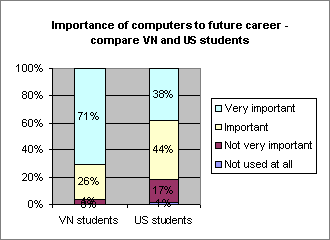In 2005, the e-Divide Team carried on a survey and compared computer use among US and Vietnamese students. They found that that Americans did use computers more frequently at home and at schools. One of the reasons might perfectly be that even if the proportion of students having one computer at home almost equal among US and Vietnamese students, most of these computers in the US where connected to the Internet, while more than half of the Vietnamese where not. When looking at computer availability at the school, 92% of American students almost never had problem to access computers at school, vs. only 21% Vietnamese.
So far, the charts bring no big news. But the following one is really interesting:

Source: e-Divide!
The authors of the survey read these data this way:
Awareness of the role of computers in the future
Most students at Pinkerton Academy think that computers are important for their future career. However, Vietnamese students have much higher awareness of this issue. While only 38% of American students think that computer is very important to their future career, this number is 70% in Vietnamese students.
One explanation for this way of thinking is that while computer use “wouldn’t make a difference” for any American, digital literacy in Vietnam really can, as we have seen in Bangladesh or India’s Bangalore, where — among others — offshoring of coding routines to these countries have hugely impacted local economies and created the emergency of new middle classes based on the IT Industry.
But I’d rather explore a second explanation. In 1987, Robert Solow stated his famous aphorism You can see the computer age everywhere but in the productivity statistics
, known as the Solow Paradox. These “invisibility of computers” has sometimes been related to the “invisibility of technology”: some technologies (i.e. electricity) have become so natural that have become factually invisible, hence you click on the switch and don’t see light coming out of a miracle. Thus, computer are so perfectly integrated within productive processes that have become invisible for statistics.
Under this point of view, the question is: who is, really, more aware of computer’s impact on one’s career: Vietnamese students, 71% of whom state that computers are very important
to their future career? or American students, which for a 62% of whom computers have already become invisible?
To stress this last point, let’s remember that Vietnam ranked 178th (out of 181) in the Digital Opportunity Index for year 2006 and had just 23% of the value of the US score to the ICT Opportunity Index for the same year (76.66 vs. 322.73). To make things simpler, let’s consider a country with almost 100% literacy (not digital, but just read and write), and another country ranking quite poor in this aspect. And let’s put the former question under this new approach: Importance of being able to read and write to future career?
. In the first country, the highly literate, no one would even consider saying that being able to read and write makes any difference, as everyone is supposed to be able to, hence you’ll be judged by other skills. In the second country, literate people would consider, on the contrary, that this is a highly valuable skill.
Yet another example. Put it in another scenario: all in all, who’s got more e-Awareness? Digital Immigrants or Digital Natives?
If you need to cite this article in a formal way (i.e. for bibliographical purposes) I dare suggest:
Peña-López, I. (2007) “e-Awareness and the invisibility of computers” In ICTlogy,
#45, June 2007. Barcelona: ICTlogy.
Retrieved month dd, yyyy from
https://ictlogy.net/review/?p=560
Previous post: Global Theme Issue on Poverty and Human Development Planned for October 2007
Next post: Project Internet Catalunya: education, digital divide, e-Awareness
 RSS feed for comments on this post.
TrackBack URI
RSS feed for comments on this post.
TrackBack URI

